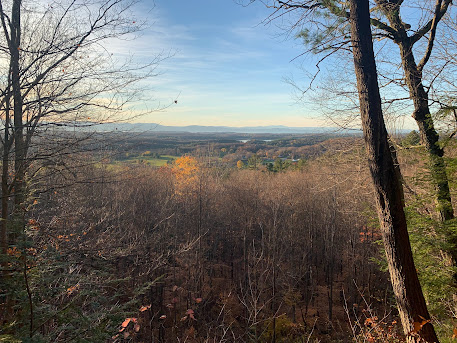Walking through the woods
I came to a tall aspen
that I had not seen
standing in the midst
of the woods in the next town,
leaves yellowish green.
All summer – and it
chances for so many years –
it has been concealed.
Perhaps the largest
of its species that I know,
I stumbled on it
by mere accident
after walking a couple
hours the other day.
Peculiar in
its solitude it seemed the
obscurest of trees.
From this hilltop
Now to my surprise
a mile off across the pond
I see one large tree
which I distinguish
by form and color to be
my new acquaintance
Tremulifomis
the only yellow I see –
my tallest aspen
the most distinct tree
in all the landscape coming
half-way to meet me.
October 29, 2022
See October 29, 1858 ("Am surprised to see, by the path to Baker Farm, a very tall and slender large Populus tremuliformis still thickly clothed with leaves which are merely yellowish greén, later than any P. grandidentata I know.") and December 15 , 1841 ("The trees have come down to the bank to see the river go by."); See also A Book of the Seasons, by Henry Thoreau, the Aspens; November 4, 1858 (“The actual objects which one person will see from a particular hilltop are just as different from those which another will see as the persons are different . . .We cannot see any thing until we are possessed with the idea of it”); November 28, 1858 (“And all the years that I have known Walden these striped breams have skulked in it without my knowledge!”)
After walking for a couple of hours the other day through the woods,
I came to the base of a tall aspen,
which I do not remember to have seen before,
standing in the midst of the woods in the next town,
still thickly leaved and turned to greenish yellow.
It is perhaps the largest of its species that I know.
It was by merest accident that I stumbled on it,
and if I had been sent to find it,
I should have thought it to be, as we say, l
ike looking for a needle in a haymow.
All summer, and it chances for so many years,
it has been concealed to me;
but now, walking in a different direction,
to the same hilltop from which I saw the scarlet oaks,
and looking off just before sunset,
when all other trees visible for miles around are reddish or green,
I distinguish my new acquaintance by its yellow color.
Such is its fame, at last, and reward for living in that solitude and obscurity.
Such is its fame, at last, and reward for living in that solitude and obscurity.
It is the most distinct tree in all the landscape,
and would be the cynosure of all eyes here.
Thus it plays its part in the choir.
I made a minute of its locality,
glad to know where so large an aspen grew.
Then it seemed peculiar in its solitude and obscurity.
It seemed the obscurest of trees.
Now it was seen to be equally peculiar for its distinctness and prominence . . .
It is as if it recognized me too, and gladly,
coming half-way to meet me,
and now the acquaintance
and now the acquaintance
thus propitiously formed will,
I trust, be permanent.
I trust, be permanent.
A Book of the Seasons, by Henry Thoreau, The Tallest Aspen
A Book of the Seasons, by Henry Thoreau
"A book, each page written in its own season,
out-of-doors, in its own locality."
~edited, assembled and rewritten by zphx © 2009-2022
https://tinyurl.com/HDTaspen











